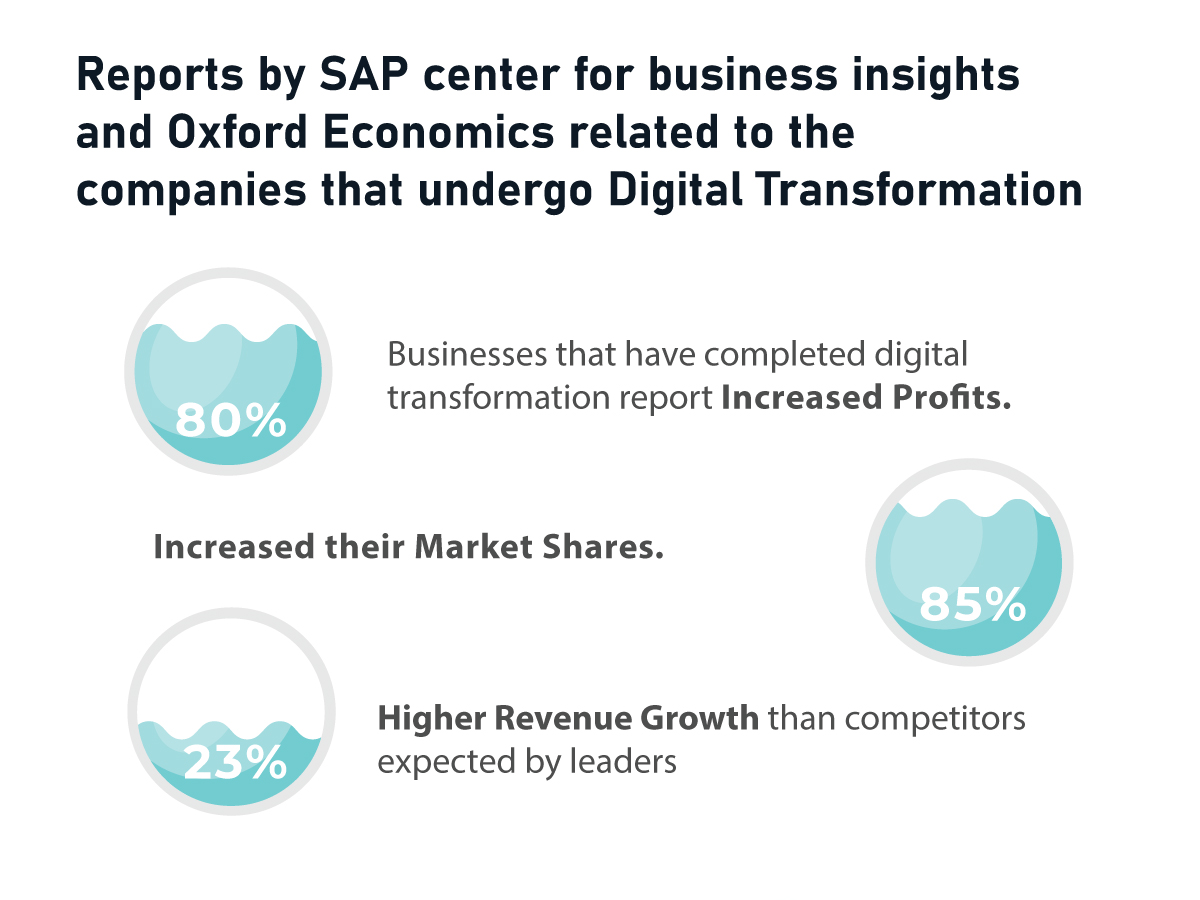Introduction:-
Digital transformation is the integration of digital technology into all areas of a business. This results in some fundamental changes in the process of business operation. Most organizations are implementing digital transformation to make their business more efficient and gain more profits.
According to a recent study, more than 90% of business organizations are shifting toward cloud technology. As they deal with moving the bulk of data to the cloud, much of what is being done is just to replicate the existing services in digital format. Actual digital transformation is so much more than that. It creates a technology framework to transform these services and data into actionable insights that can improve every facet of the business.
Rather than simply migrating the data to the cloud, it allows for reimaging systems and processes to work together smartly to provide more robust business intelligence.
Importance of Digital Transformation:-
Digital transformation is changing the way any business organization operates. Systems, processes, workflow, and culture are all evaluated. This transformation affects each level of the organization and brings together data across different verticals to work together more efficiently.
By taking advantage of workflow automation and advanced processing techniques, like Artificial Intelligence (AI) and Machine Learning (ML), companies can connect the dots on the customer journey in a way that wasn’t possible before.
Benefits of Digital Transformation:-
For many companies, the driver for digital transformation is cost-related. Moving data to a public, private, or hybrid cloud environment lowers the operational cost. It also frees up hardware and software costs while freeing up team members to work on other projects.

So, Let’s get into depth and learn more about some of the most useful advantages of the digital transformation process.
Enhanced Data Collection Methods:-
Most businesses are collecting a huge amount of data on their customers but the real benefit is optimizing this data for analysis that can drive the business forward. Digital transformation creates a system for gathering the right data and incorporating it fully for business intelligence at a higher level.
This also creates a way through which different functional units within an organization can translate raw data into insights across various touchpoints. By doing this, it produces a single view of the customer journey, operations, productions, finance, and business opportunities.
Data-Driven Customer Insights:-
Data can be the key to unlocking the gate to customer insights. By better understanding your customers and their needs, one can create a business strategy that is even more customer-centric. Using structured data (customers’ personal information) and unstructured data, such as social media metrics, can help drive more business and increase revenue.
Data also enables strategies to provide more relevant, personalized, and agile content to the business organization.
Improved Productivity:-
Having the right tech tools that work together can streamline workflow and improve productivity. By automating many manual tasks and integrating data throughout the organization. Digital transformation also empowers team members to work more efficiently.
Greater Resource Management:-
Digital transformation consolidates information and resources into a suite of tools for business. Rather than dispersed software and databases, it combines company resources into one place. According to Statista, the average number of apps used in enterprise business in 2020 is 900. Just imagine how difficult and hasslesome it would be to provide a consistent experience. With the implementation, of the Digital Transformation process, the business organization can integrate applications, databases, and software into a central repository for business intelligence.
Digital transformation is not a department or functional unit. It encompasses every industry like education, healthcare, logistics, sports, and e-commerce, and can lead to process innovation and efficiency across units.
Increased Profits:-
Companies that undergo digital transformation improve efficiency and profitability. Below we are mentioning some of the reports by SAP center for Business Insights and Oxford Economics.

Better Customer Experience:-
Customer expectations are very high when it comes to their experience. Customers have several choices at even better prices and faster delivery services, thus, making customer expectations a newer and tougher challenge. According to Gartner, more than two-thirds of companies state that they are competing mostly on customer experience. By the end of this year, they are expecting a rise in this figure by 85%.
Increased Agility:-
Digital Transformation makes organizations more agile. Adapting from the world of software development, businesses can increase their agility with digital transformation to improve speed-to-market and adopt continuous improvement strategies. This allows faster innovation and adaptation while providing a path to improvements.
Encouraging Digital Culture:-
By providing team members with the right tools, tailored to their environment, digital transformation encourages a digital culture.
While these tools provide an easy way for collaboration, they also help to move the entire organization ahead digitally. This digital culture will be very crucial in the future. This also enforces the upskilling and digital learning of team members to take advantage of the digital transformation process.
Conclusion
Digital transformation is redefining how companies are operating from the ground ups. From better data collection to an improved customer experience, organizations are getting many benefits like cost saving and improvements in their profit rate. It is believed that the digital transformation movement will continue to enhance.
IDC predicts that by the end of 2023, 53% of all investments in information and communication technology will be in digital transformation.
One of the greatest challenges with digital transformation is the integration of different systems into a consolidated workflow. Data management and security protocols must be in sync, yet data security is one of the major challenges for all organizations.
If you are looking to implement the best digital transformation process into your business, get in touch with us at CodeStore Technologies, a custom software development company in England.

